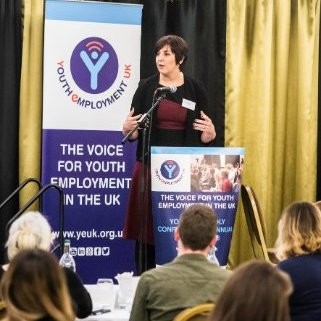Youth Employment UK believes that to tackle youth unemployment and the social inequalities that exist, we must ensure quality across education, training and employment pathways. The support systems around our young people need to be better funded so all young people have fair and equal access including education, careers, youth and health services, social care and welfare. We must help employers to understand that young people can and should play a pivotal part in their growth and that by creating a youth friendly economy we all benefit.
This budget has gone some way to improving the structures around young people but there is room for improvement and we will continue to work with government to ensure that young people remain a key focus for government policy and investment.
Increased National Living Wage and National Minimum Wage rates
The Chancellor celebrated the fact that unemployment is down to 4.0%, the lowest levels since 1975, and he is right to recognise the progress particularly with the Office for Budget Responsibility (OBR) forecast of a higher level of employment every year of the forecast. However we cannot ignore that as a young person you are still nearly 3 times as likely to be unemployed and the growing concern for those ‘hidden’ from official figures. Recognising pay as a barrier to work and to social mobility is an important first step, but we also have to support those struggling to engage with the system.
Earlier this year we provided input into the Low Pay Commissions (LPC) Low Pay Review and we urged the LPC to make bold recommendations particularly around the apprenticeship wage. It is our belief that young workers should be paid fairly for the work that they do and that minimum wage can often disadvantage the most vulnerable young people.
The Chancellors support of the Low Pay Commission Review is a small step in eradicating in-work poverty and we urge the Chancellor and the LPC to accelerate the plans for higher minimum wages. The Personal Allowance increase to £12,500 is small compensation.
We will continue to champion the importance of raising the Apprenticeship wage and in fact removing it all together so that all apprentices are paid the age appropriate minimum wage, but in the meantime will look forward to supporting those Youth Friendly Employers who ensure fair pay to the young people in their employ.
| Age | Minimum hourly rate 2018-19 | Minimum hourly rate 2019-20 |
| 25 and over | £7.83 | £8.21 |
| 21 to 24 | £7.38 | £7.70 |
| 18 to 20 | £5.90 | £6.15 |
| Under 18 | £4.20 | £4.35 |
| Apprentice | £3.70 | £3.90 |
Education
There were few announcements around the education system to get excited about, and we are disappointed not to see further investment in schools and colleges. These key institutions are pivotal in supporting the life chances of our young people and whilst budget impacts the number of teachers or support staff available, young people will be the ones who miss out.
With schools fighting heavy budget cuts and with significant issues remaining including staff pay, teacher shortages and facility repairs, £10,000 per primary school or £50,000 per secondary school is nothing more than tokenism. We will continue to call on government to ensure that schools have the budget they need to support every child to fulfil their potential including the provision for skill development and careers guidance. Young people told us in our Youth Voice Census that not knowing what skills they need for employment, or what careers exist are two of the biggest barriers to employment. Proper funding for schools to support these areas is essential if we are to see young people thrive post education.
Our colleges have also been making the case for an increase in funding, how can they create parity and quality when they are so underfunded? The Autumn budget overlooked these calls but perhaps there is time left to lobby government ahead of the spending review? We know through our Youth Voice Census that young people really benefit from FE, and with a budget so focused on productivity and plans to boost employment further, it is an oversight not to be focusing and investing in FE and our young people.
The Chancellor announced:
- £400 million for schools in England this year to spend on their equipment and facilities
- £10 million regional trial to test how to improve retention of early career maths and physics teachers
- £200 million for a Youth Endowment Fund (YEF) to help young people avoid a life of violence
Apprenticeships & Skills
It is encouraging to see government’s continued investment and support for the growth of apprenticeships, and a further commitment to increase the quality of vocational pathways. It is welcome news to hear that they are halving the small business contribution rate for apprenticeship training, and providers are sounding confident that this will increase small business engagement with apprenticeships. Businesses and business bodies are still hoping the government will address concerns such as greater flexibility to spend the levy on additional training and recruitment services. I wonder if the 5% contribution is a concession to this or simply the start of government flexing the system?
We note that government will be working with the IFA and business to identify gaps and address bottlenecks in the system that are holding up some of the apprenticeship standards. This is a good thing which should be welcomed. It will also be important to ensure that there is a commitment to developing level 2 apprenticeships as well as the higher levels. For many young people the level 2 apprenticeship is just the start they need to begin their career journey.
Manchester is benefiting from a £20 million skills pilot which will include support for young people, and we are pleased to see the investment in innovation regarding youth employment programmes. Manchester have made some good headway with programmes such as Talent Match and it will be interesting to see and learn from the innovation to come.
The Chancellor announced:
- Apprenticeships: halve co-investment rate to 5%
- Levy paying employers to transfer up to 25% of their funds to pay for apprenticeship training in their supply chains
- £5 million to the Institute for Apprenticeships and National Apprenticeship Service in 2019-20, to identify gaps in the training provider market
- Regional pilot of on-the-job training for young people
- T levels – The government will provide £38 million of capital funding to support implementation of the first three T levels in 2020 across 52 providers
- Human capital – The government is working with the ONS to better understand how its investment in people helps improve their earning and skills potential.Post-18 education and funding
Mental health
It is good news that government are recognising the pressure mental health services are under and have invested in the NHS to support this. We know that there is an increase in young people reporting mental health problems, supporting young people early to build the skills to manage and look after their own mental health is something that we know young people would like to see more of.
The Chancellor announced:
- The NHS is the government’s number one spending priority.
- Funding for mental health services will grow as a share of the overall NHS budget over the next 5 years.
- The NHS will invest up to £250 million a year by 2023-24 into new crisis services, including: 24/7 support via NHS 111; children and young people’s crisis teams in every part of the country; comprehensive mental health support in every major A&E by 2023-24; more mental health specialist ambulances; and more community services such as crisis cafes. The NHS will also prioritise services for children and young people, with schools-based mental health support teams and specialist crisis teams for young people across the country.
Welfare
Universal Credit has seen huge controversy since its launch, Esther McVey herself confirmed that the government has had to make some “tough decisions”. There are real tensions in the system that need to be addressed including the way young people are supported through the Youth Obligation Support Programme. Young people tell us that they look for alternative support rather than choose to engage with a Jobcentre and this is something that needs to be addressed. Often alternative support is poor quality and unsustainable, and the assistance that a Jobcentre offers can add real value and could help a significant number of young people move quickly into well paying and secure jobs.
We will be watching closely to see how this policy area evolves.
The Chancellor announced:
- The Work Allowance – will be increased by £1,000 from April 2019
- The Budget announces an extensive package of extra support for claimants as they make the transition to Universal Credit
- Government will extend additional payment provision to cover the income-related elements of Jobseeker’s Allowance and Employment and Support Allowance, and Income Support.
- To support the transition to Universal Credit for all self-employed people, the government is also extending the 12-month grace period
- Government will reduce the maximum rate at which deductions can be made from a Universal Credit award from 40% to 30% of the standard allowance







